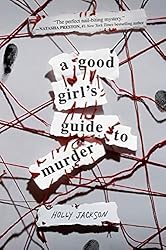A Good Girl's Guide to Murder
Holly Jackson, 2020
Random House
400 pp.
ISBN-13: 9781984896360
Summary
An addictive, twisty crime thriller with shades of Serial and Making a Murderer about a closed local murder case that doesn't add up, and a girl who's determined to find the real killer—but not everyone wants her meddling in the past.
Everyone in Fairview knows the story.
Pretty and popular high school senior Andie Bell was murdered by her boyfriend, Sal Singh, who then killed himself. It was all anyone could talk about. And five years later, Pip sees how the tragedy still haunts her town.
But she can't shake the feeling that there was more to what happened that day. She knew Sal when she was a child, and he was always so kind to her. How could he possibly have been a killer?
Now a senior herself, Pip decides to reexamine the closed case for her final project, at first just to cast doubt on the original investigation. But soon she discovers a trail of dark secrets that might actually prove Sal innocent … and the line between past and present begins to blur. Someone in Fairview doesn't want Pip digging around for answers, and now her own life might be in danger.
This is the story of an investigation turned obsession, full of twists and turns and with an ending you'll never expect. (From the publisher.)
Author Bio
Holly Jackson started writing stories at a young age, completing her first (poor) attempt at a novel when she was fifteen. She graduated from the University of Nottingham, where she studied literary linguistics and creative writing, with a master's degree in English.
She enjoys playing video games and watching true-crime documentaries so she can pretend to be a detective. She lives in London. A Good Girl's Guide to Murder is her debut novel. (From the publisher.)
Book Reviews
Jackson sprinkles the fast-paced narrative with Pip’s notes, project logs, and interview transcripts—as well as several cleverly placed red herrings—…[and] caps her suspenseful, well-plotted mystery with a few twists readers likely won’t see coming (Ages 14–up).
Publishers Weekly
Jackson wonderfully crafts the mystery so that readers can create their own hypotheses as Pip puts the pieces together—but they won't find out the truth until she does.… A wonderful addition to any library collection (Gr. 9–up). —Amanda Borgia, Uniondale Public Library, NY
SchoolLibrary Journal
Fans of true crime will be hooked by the hunt for a killer, but there’s more to this Guide than just a whodunit. It’s a story of families, community and the ways a crisis can turn them against one another in the blink of an eye.
BookPage
Pip's sleuthing is both impressive and accessible.… Jackson's debut is well-executed and surprises readers with a connective web of interesting characters and motives.… A treat for mystery readers who enjoy being kept in suspense (Young Adult).
Kirkus Reviews
Discussion Questions
We'll add publisher questions if and when they're available; in the meantime, please use our GENERIC MYSTERY QUESTIONS to start a discussion for A GOOD GIRL'S GUIDE TO MURDER … then take off on your own:
GENERIC DISCUSSION QUESTIONS
Mystery / Crime / Suspense Thrillers
1. Talk about the characters, both good and bad. Describe their personalities and motivations. Are they fully developed and emotionally complex? Or are they flat, one-dimensional heroes and villains?
2. What do you know...and when do you know it? At what point in the book do you begin to piece together what happened?
3. Good crime writers embed hidden clues in plain sight, slipping them in casually, almost in passing. Did you pick them out, or were you...clueless? Once you've finished the book, go back to locate the clues hidden in plain sight. How skillful was the author in burying them?
4. Good crime writers also tease us with red-herrings—false clues—to purposely lead readers astray? Does your author try to throw you off track? If so, were you tripped up?
5. Talk about the twists & turns—those surprising plot developments that throw everything you think you've figured out into disarray.
- Do they enhance the story, add complexity, and build suspense?
- Are they plausible or implausible?
- Do they feel forced and gratuitous—inserted merely to extend the story?
6. Does the author ratchet up the suspense? Did you find yourself anxious—quickly turning pages to learn what happened? A what point does the suspense start to build? Where does it climax...then perhaps start rising again?
7. A good ending is essential in any mystery or crime thriller: it should ease up on tension, answer questions, and tidy up loose ends. Does the ending accomplish those goals?
- Is the conclusion probable or believable?
- Is it organic, growing out of clues previously laid out by the author (see Question 3)?
- Or does the ending come out of the blue, feeling forced or tacked-on?
- Perhaps it's too predictable.
- Can you envision a different or better ending?
8. Are there certain passages in the book—ideas, descriptions, or dialogue—that you found interesting or revealing...or that somehow struck you? What lines, if any, made you stop and think?
9. Overall, does the book satisfy? Does it live up to the standards of a good crime story or suspense thriller? Why or why not?
(Generic Mystery Questions by LitLovers. Please feel free to use them, online or off, with attribution. Thanks.)


